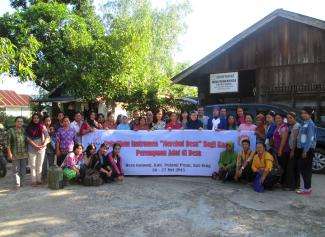Over the last decade all kinds of international institutions have demonstrated special attention towards giving equal opportunities to women and while a number of our partners are already aware of gender sensitive issues, Samdhana continues to make efforts to support gender sensitivity.
In Indonesia one of our initiatives in gender equality is our work with Karsa: the Circle of Renewal of Rural and Agrarian Areas, helping women in traditional roles in Poso Regency, Central Sulawesi, West Kutai and Mahulu, East Kalimantan, and Pulang Pisau Regency, Central Kalimantan. Karsa aims to give women a voice in the development of their villages. By reaching out to local government and village we increase awareness within government regarding the importance of women's contribution.
In spite of many challenges Karsa have managed to access funding from local government for activities proposed by women for their Middle Term Village Development Plan. The Gemawan initiative to support farmer's wives in organic farming and overcoming problems facing agriculture such as the decrease in harvest yield due to pests in Singkawang and Sambas Regencies, West Kalimantan, is another success story. Gemawan is supporting capacity-building among these women farmers by placing them in contact with regional farming instructors and a University of Tanjungpura group that is reviving traditional pest eradication methods.
In the Philippines, small grants are supporting women's participation in important discussions such as the Mindanao-wide indigenous peoples' group Kalumaran's regional assembly session to hear indigenous women's perspectives and concerns on unabated conflicts in ancestral domains and continued recruitment of family members into various armed groups.
The national Indigenous Women's Gathering organized by LILAK Purple Action for Indigenous Women's Rights, a collective of women's rights advocates and feminists which aims to contribute in the building and raising awareness and understanding of rural and indigenous women on their rights, their roles, and potentials, tackled the life threatening issues of traditional birth-giving and maternal health, as well as reproductive health practices of indigenous peoples severely delimited by recent national health policies. This dialogue brought signi cant national government agencies to hear the issues of traditional hilot (midwives) and caregivers. From the Indigenous Women's gathering emerged signi cant recommendations on taking forward the advocacy to recognize and promote culture-based traditional maternal and reproductive healthcare of indigenous peoples, both at a local level for research and documentation, and in policy lobbying and enhancing national agencies' program implementation to recognize IP rights and practices.
In Mekong we support woman-led community-based natural resource management and development. In Haitay, villagers promote the use and production of organic fertilizers, and have established a learning farm to encourage them to raise their own local food such as frogs and shes. A village woman, Mrs. Bounthanh, is teaching and sharing her traditional knowledge with other villagers. We have also supported the establishment of a tree nursery for endemic, medicinal and commercial trees in Vientiane, and the planting of native rattan species in Ban Na, Savannakhet Province. These self-initiated projects by village groups aim to improve the income of families who are highly resource-dependent and at the same time conserve their sources of food, non-timber forest products (NTFPs), medicines and other basic needs.
See more at The Samdhana Institute Annual Report 2015




